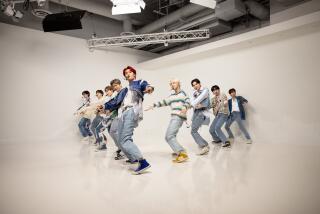For RockTigers, it’s rockabilly and a lot of Seoul
- Share via
Reporting from Seoul — The band took the stage at midnight, five South Korean musicians with day jobs and a dream of stardom playing an unlikely brand of music borrowed from another place and time.
Early in a frenetic 12-song set, the RockTigers launched into an old standard that made the crowd, most of them foreigners, many already standing, jammed near the stage, surge in movement.
An American turned to a companion. “Elvis,” she shouted.
It was the King’s “Baby, Let’s Play House,” being crooned in Korean by lead singer Velvet Geena. Dressed in tall boots, a white leather jacket and swirly red dress, her black hair dyed impossibly blond, she led the band in a fluid progression of rockabilly beats that trace their roots back 60 years earlier, to 1950s rural America.
It’s a Korean twist on the rocker as rebel story. In a conservative culture in which parents dream of their daughters meeting a nice Korean boy, Velvet Geena recalls sneaking out of the house in her rocker boots to join the band for gigs.
Her band mates, all slicked-up pompadours, U.S. Navy tattoos and cut-off sleeves, made old-school moves straight out of Memphis, one spinning a big slap bass decorated in flames and leopard print, with the rhythm guitarist named Tiger crouching, gyrating, peeling off exaggerated guitar strokes.
The rockabilly riffs flowed, one into the other, minus any preening breaks between songs, with Velvet Geena’s smile beaming nonstop. This was a band that wasn’t taking itself too seriously, just five talented musicians having fun with another culture’s music they were seamlessly making their own.
“They’re so fresh,” said Keigh Cleveland, an Ohio transplant, as she danced at the bar. “It’s not just the style, the hair — you can tell they really like the music they play.”
In a South Korean music industry dominated by often bland pretty-boy-and-girl K-pop bands, the RockTigers have developed a cult following among foreigners here with the unique retro sound they call Kimchibilly.
It’s an Asian version of the old rockabilly genre that combines rock music with the sounds of swing, bluegrass and hillbilly, summoning images of Buddy Holly, bobby socks and malt shops — but mostly sung in Korean.
Assuming stage names such as Tiger, Roy, Eddie Tarantula and Jack “The Knife,” the RockTigers have attracted a following mostly of young Americans and foreign English teachers.
And though most young Koreans have yet to embrace the sound, the band hasn’t missed a beat, playing regular gigs in Seoul’s Hongdae university area, mixing in an occasional tour in Japan.
But the place they really want to play is America. For Velvet Geena, who sports tattoos of angels wings on her back — she pays the rent by modeling underground fashion — it would be a pilgrimage back to the home of the music she has come to love.
“America is the heart of where this music all started,” she said. “We want to explore the roots of rockabilly.”
The RockTigers formed in 2001 as an experiment with different musical styles. “We weren’t serious, we started out just to have fun,” says Tiger, who, along with Velvet Geena, makes up the band’s creative core. “We were all sunglasses, leather and loud volume.”
In a video from their debut album “Come on Let’s Go!” the band plays off the outsider image. Decked out in leather and boots, they dance and parade inside a Seoul subway car as baffled middle-age passengers look on.
Gathering material for their second album in 2004, the RockTigers were in search of a new sound. That’s when they turned to rockabilly, a genre they’d seen only in old Internet videos.
“We liked the sound and the fact that nobody was doing it in Korea,” recalled Tiger, who by day is a Web designer. “But it was difficult to learn the technical things about the music, like the different backbeat.”
The band studied the musical style and dress of such pioneers as Jerry Lee Lewis, Wanda Jackson and Eddie Cochran. Then a studio photo they took of themselves in rockabilly garb gave them their first break.
Based on the publicity shot alone, they were invited in 2004 to perform at the Tokyo Big Rumble, a rockabilly music festival. That’s where the audience and the promoters learned that the band from South Korea didn’t just look the part — they could really play.
Encouraged by the warm reception in Japan, the band returned to Korea to release two more CDs, including this year’s “Rock ‘N’ Roll Licence.”
They also began sponsoring monthly events known as “Kimchibilly” nights — a reference to the famous South Korean pickled vegetable — with guest bands from South Korea and Japan to promote the new boogie-woogie sound.
They admit their success with young Koreans has been mixed, but foreign fans often arrive at shows dressed in ponytails and pompadours.
“We never targeted foreigners, they just come to see us,” said Velvet Geena. “Many Koreans still think we’re a little weird.”
West Virginia native Michael Kunhavijit sees every RockTigers show he can. “Where I’m from rockabilly is big and so seeing them is a reminder of home,” he said. And if the band can’t cure homesickness, the online world offers help.
“The Internet pushes influences from the West into South Korea, Japan — but it also goes in the other direction — there’s a mutual fascination,” said Stephen Epstein, director of the Asian Studies Institute at Victoria University in Wellington, New Zealand, who has written about the Korean punk music scene.
“You can get on the Internet and hear just about anything, from Indonesian rock to Mongolian hip-hop, all with the click of a mouse.”
That doesn’t mean that the RockTigers are expecting Westerners to translate their lyrics; the band has been recording English versions of many of their songs. “We’re looking for an international spotlight,” said Tiger, expressing a desire that transcends cultures. “Once we have that, maybe the Koreans will follow.”
Some already have. At the recent midnight show, 24-year-old Goo Ban-sook sucked down a gin and tonic and danced in place.
“I close my eyes and I hear Elvis Presley,” he said, “my father’s favorite form of music.”
More to Read
The biggest entertainment stories
Get our big stories about Hollywood, film, television, music, arts, culture and more right in your inbox as soon as they publish.
You may occasionally receive promotional content from the Los Angeles Times.








